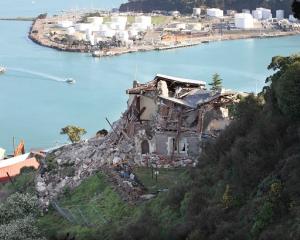Two years on from Christchurch's first major earthquake, Dunedin's economy remains vulnerable to adverse flow-on effects, Otago Chamber of Commerce chief executive John Christie says.
The earthquakes compounded economic problems at the time and had probably forced a few small Dunedin businesses to close, he said.
‘‘While the earthquakes were more tragic for those living in Christchurch, they've also been quite devastating economically outside of the city. We haven't come out unscathed.
''It has been detrimental to some businesses and I would even go so far as to say that some businesses have closed their doors in Dunedin as a result.''
Tourism was hit hard, visitor numbers decreasing throughout the South Island, even during last year's Rugby World Cup.
The manufacturing, hospitality, retail and service sectors were also adversely affected.
Dunedin firms supplying the larger Christchurch market were forced to find alternative buyers, downsize or absorb losses, Mr Christie said.
‘‘Any upside we've seen that's come as a result of relocation of business wouldn't outweigh the losses that our region's experienced. We aren't hearing much about the cost of lost economic activity for the South Island, including Dunedin, and I would pick that's a significant figure.''
The rebuilding of Christchurch was expected to cost from $30 billion to $40 billion and provide work for Dunedin businesses, but it would be ‘‘some time'' before benefits were widely felt, Mr Christie said.
‘‘We are hearing of some [firms] getting more positive order books, but it's still a pretty fickle environment out there. It's held back company investment into plant, capital and people, and many are using cash reserves, or even refinancing, just to stay in business.''
The Dunedin City Council's economic development unit was helping local business owners and workers make the most of increasing opportunities in Christchurch.
Unit manager Peter Harris said it was important Dunedin did not lose residents to Christchurch during the rebuilding and workers were encouraged to keep their local family base and commute.
There was a huge amount of work to be done in Christchurch, and Dunedin businesses had to make the most of the situation they were in, he said.
‘‘Our construction sector in a year does about 1% of what's going to be spent on the rebuild in Christchurch.''
The unit was investigating ways to increase prefabrication in Dunæ edin, so workers could remain in the city and supply ready-made buildings in part or whole to Christchurch, Mr Harris said.






